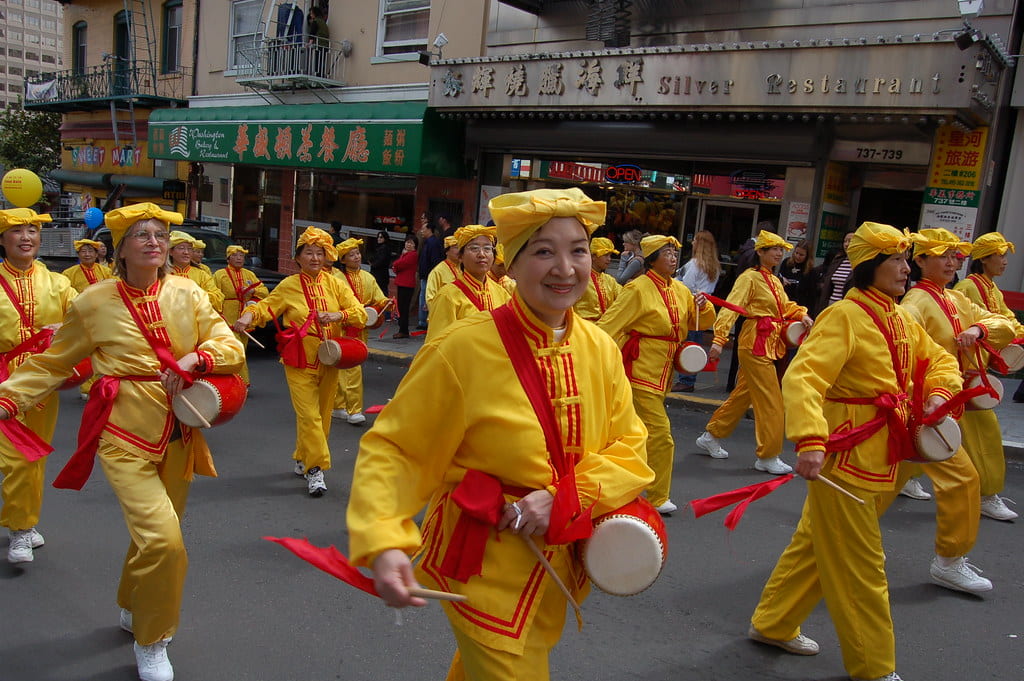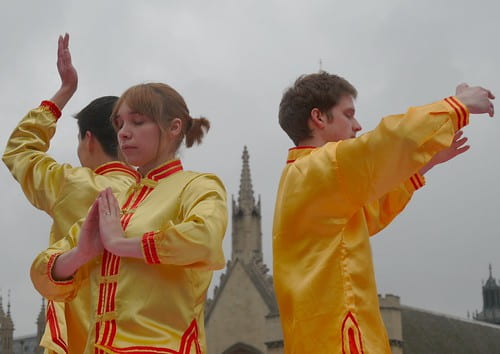
Content Warnings: imprisonment, religious persecution, torture, trafficking, rape, brainwashing
Falun Gong, officially known as Falun Dafa, is a form of qigong, which roughly translates to ‘cultivation.’ Qigong is similar to yoga or tai chi and focuses on the perfection and refinement of mind and body. Falun Gong takes this a step further and incorporates the cultivation of morality and virtue. In 1992, Li Hongzhi introduced the practice to China. As the practice grew in popularity, excitement about the health and wellness benefits associated with the tradition have flourished. Not only this, but the culture of Falun Gong experienced a rediscovery of ancient Chinese philosophies combining elements of Daoism, Buddhism, and Confucianism.
Government Involvement
The Chinese government largely celebrated the practice throughout the 1990s, but on April 25th, 1999, the Chinese Communist Party (CCP), led by Jiang Zemin, launched a violent campaign against Falun Gong by issuing a letter expressing their wish to see Falun Gong destroyed. The atheist communist regime, which notoriously rules by the threat of force, was itself threatened by the emphasis on morality and traditional Chinese culture found in practitioners.
Since 1999, an organization called Friends of Falun Gong has reported cases of torture, disappearance, brainwashing, rape, and death of Falun Gong practitioners by the CCP. When a person dies while imprisoned, families are told that their loved one committed suicide or died of a disease, but the bodies are cremated before evidence can be gathered. Notably, a relatively new development alleges that many of these detainees are victims of organ trafficking.

Through propaganda campaigns, the CCP has classified Falun Gong as a xiejiao, which in some contexts has similar implications to the word ‘cult.’ Personally, as someone who actively studies religion and cults, I would not qualify the practice as a cult, as it does not pass any widely accepted tests qualifying organizations as cults.
Propaganda and Unclear Beliefs of Americanized Version
In my research about Falun Gong, I found very conflicting information about the moral beliefs of practitioners. Officially, they have three significant tenets: Zhen, Shan, and Ren, which translate to truthfulness, compassion, and tolerance, respectively. They emphasize ancient Chinese values and, by my evaluation, hold a form of virtue ethics. As far as I can tell, the version being practiced in China is unharmful and beneficial to its practitioners. The relationship between Chinese practitioners of Falun Gong and the Americanized version based in New York is unclear. The following are productions of the official organization of Falun Dafa.

Shen Yun is a dance-based performance/production sponsored and organized by Falun Dafa. They are based in New York City and perform internationally but do not perform in China for fear of persecution. The performance has themes of anti-Marxism, anti-atheism, and a passing instance of homophobia. Jio Tolentino, a writer for the New Yorker, saw the show twice in New York and calls the production uncanny and unsettling. Throughout my research, I have not found any instances of China-based practitioners personally expressing the themes seen in Shen Yun.
![]()
The Epoch Times is a newspaper sponsored by and associated with Falun Dafa. While claiming to be “unbiased,” they post far-right opinion pieces and side with Trump in many of their political articles. To anyone with an ear tuned to the sound of right-wing dog whistles, the Epoch Times website is loud, high-pitched, and painful. Again, I have not found any instances of China-based practitioners expressing the harmful themes found in the Epoch Times. It seems to me that the Americanized version of Falun Gong is a harmful version of what is being practiced and persecuted in China.
Religious Rights and Persecution
Human rights, with respect to a person’s religion, is a complicated subject. Too often, we see people using the excuse of religious freedom to act in a bigoted way toward certain communities. Religion is a personal practice meant, consciously or otherwise, to help a person cope with and understand the trials and tribulations of existing as a human in this world. Sometimes, that religion will come with a set of morals that each practitioner decides to follow. People have a natural right to practice their own religion and to determine their own moral codes without persecution or intervention. But, as with every right, this only extends insofar as it does not impede the rights of others.

The CCP must be held accountable for imprisoning, torturing, and trafficking the organs of Falun Gong practitioners in China. These people are not impeding on the rights of others. They peacefully practice truthfulness, compassion, and tolerance while aligning their body and mind through qigong. In accordance with my working definition of religion, nobody deserves to face religious persecution. Everyone has a right to decide how they will come to terms with and cope with their own existence. It is important that, as humans, we keep certain spaces safe for people to cultivate their spirituality. By taking away every space that may be safe for these people to practice, the CCP is violating their rights.

Published by